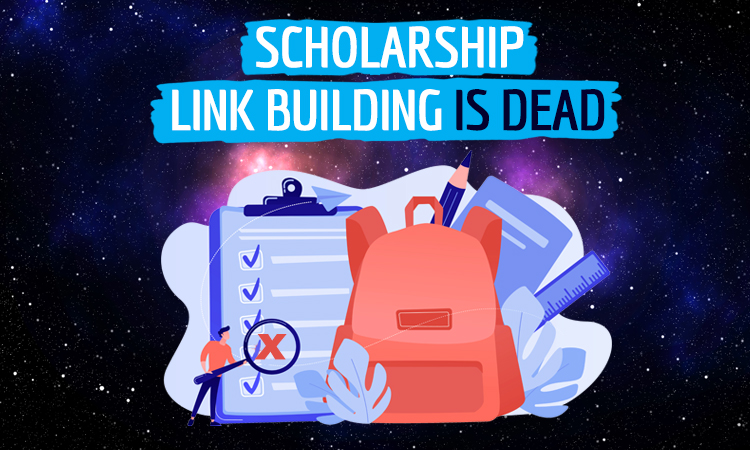Scholarship Link Building
This article was originally published in 2017 and last updated on 12-30-21. As originally predicted, scholarship link building has created some issues. Google issues a manual link penalty and includes scholarship links in the examples of low-quality/spam links.
Increasing search engine rankings and building real authority through quality SEO link building is an essential part of any SEO driven content marketing strategy.
For a long time, in addition to editorial links that are earned and placed in trustworthy, authoritative content, easy-to-create links such as directories, social bookmarks, and donor page links have been used in an effort to boost rankings without putting in any real work. Along with those methods is another that is still offered by many today: scholarship link building.
On the surface, this seems like a great strategy. Create a scholarship, reach out to schools, and land a bunch of .edu links. Edu sites are usually trustworthy, and colleges are interested in listing them…Must be great, right?
Not so fast!
Stop and think about what is really happening with scholarship link building. You are offering money in exchange for a link placement.
The college doesn’t know you, they aren’t vouching for you and saying you’re a credible source, they are simply adding your link to potentially get scholarship money for a student to spend at their school. How is that any better than paying any other site to add your link?
I mean, come on…
If we are worried about Google knowing you secretly paid someone to add a link to an old post, we should really be concerned with a strategy that is so blatantly an exchange of money for links.
What’s more, colleges have caught on to the fact that companies are offering scholarships as a means of building links, and in response, many sites have stopped accepting new scholarships. In addition, many of these pages are just turning into low-standard link farms.
Need proof? Check out this scholarship page: https://www.ju.edu/financialaid/programs/scholarships.php Notice the “best diet pills” or the “best mattress reviews” scholarship?
Aside from the frustration and over-saturation of scholarship link building, we should also take a moment to consider what Google is out to accomplish and how these links align (or fail to) with their goals.
Understanding Google’s Game Plan
The algorithms Google uses to rank websites are proprietary and for a good reason. If they shared the secret formula, which is probably too complicated at this point for a single person to fully understand, anyone who followed it closely enough could rank for whatever they wanted, and the experience for the internet user, the searcher, would be horrific.
Remember, Google gained its dominant market share by providing better search results than all of its competitors. Their algorithms are what make that possible, and fine-tuning them to ensure the best results are still found on Google only makes sense. Not because they care about searchers, but because they want to protect their bottom line.
Any link building that aims to improve rankings that is not based upon merit increases the risk of an undeserving site showing up and frustrating a searcher, which is bad for Google’s profits. If you look at the history of link building, you can see a clear trend of link building strategies designed to manipulate search results getting hammered.
Even though most SEOs know this, they use tactics like scholarship link building to boost DA and then report increased DA to the client as proof that their tactics are working. The only problem is that increased DA does not mean better rankings, more leads, or a better ROI.
Third Party Metrics & Scholarship Page Links
One of the primary discussions in the SEO space is Domain Authority, commonly known as DA. This is a metric invented and constantly being revised by MOZ, a company that has developed many search analysis tools.
There are similar tools offered by companies like Majestic. Each uses a different metric and unique methods to analyze backlinks to determine the “quality” of a site.
The DA ratings MOZ assigns to sites are based solely upon the information they have about the site. This means DA is calculated by looking at only the links MOZ knows about, which is a mere fraction of the link data that tools like Ahrefs or Link Research Tools have.
DA is a great starting point to evaluate the quality of a website, but if you are basing your link-building decisions solely upon DA (or boosting DA), you could be digging your own grave.
Scholarship link building can increase DA. A high DA directory site can do so, but that won’t translate to a higher Google ranking.
DA is a good metric, and it does serve a purpose. Even though we use DA to communicate the average strength of links to clients, that is just the first of many criteria that a site must pass for us to place a link for our clients on it.
A good link comes from a site with:
- A thorough editorial review process
- A healthy link profile of its own
- A natural anchor text profile
- Strong keyword rankings
- A reasonable amount of organic traffic
- Quality oon-sitecontent
- A real purpose other than hosting links
In many cases, you can find DA 40,50, and even DA 60+ sites that do not meet the above criteria and are not strong links.
While scholarship pages usually do meet most of the above criteria, they are not a sign that the college is vouching for your credibility and, therefore, are not the kind of links Google will count towards higher rankings.
If boosting domain authority is your only concern, scholarship link building will do the trick, but if you want better rankings and more organic traffic, you should look into a more future-proof link building strategy.
Google is Always Watching
One of the most famous and, to some, infamous Google updates was Penguin. It shook the SEO world to the core, as many “black hat” and even “gray” techniques became instantly obsolete.
Sites that had high rankings because of these techniques sank rapidly, and some were even de-indexed and removed from Google search results entirely.
Google would “run” these scans from time to time to catch sites using these shady practices. However, as of September 2016, Penguin 4.0 now operates in real time.
Besides being always on, Penguin became more page-specific. During the last iteration, it became clear that some pages with questionable link profiles could be algorithmically penalized while other pages on the same site were not harmed.
This means that Google (and its algorithms) can review and rate individual pages more accurately than ever before.
If we apply these same abilities to reviewing link sources, we can theorize that an editorial link from a high authority site can positively impact your Google ranking, while a scholarship link from the same site would not have the same impact.
This is because Google not only looks at the site the back link is coming from, but the page it is coming from as well. This nullifies the argument that since the links are do-follow and from EDU sites, they will have the same weight as editorial placements.
Increasing Google rankings means increasing organic traffic, and every business wants to do whatever it takes to get there.
If you are paying an agency to build links or even if you are building them yourself, the best place to spend your time and resources is on real, editorial link placements.
Google is smart enough to know the difference, which means you (and most certainly a company you pay to build links) should be too.
Scholarship Link Building FAQS
Running a scholarship link-building campaign may seem like a good way to get do-follow links, but that isn’t always the case. Edu links can be harmful without the proper strategy and screening in place. Below, we look at some of the questions surrounding scholarship link-building campaigns.
Is A Scholarship Link Building Campaign Safe?
Scholarship link outreach is not as safe a strategy as many SEO agencies would lead you to believe. Scholarship pages can be spammy and low quality, even if they are on major college sites. As with almost any tactic, if you do not carefully screen each potential placement, you can end up with low-quality backlinks.
Has Google Penalized Sites for Scholarship Link Building?
Yes. In 2021, Google cited scholarship links in a manual link penalty. This shows that scholarship link building is not inherently safer or better than other tactics. Google went on to call building links with Scholarships manipulative, inferring it could be grouped with other link schemes.
What Should Be Avoided When Looking for Scholarship Links?
If you are set on running a scholarship link-building campaign, the first thing you should consider is asking the links to be made ‘no follow’, in keeping with what Google would expect to see from a paid link. You should also manually review the scholarship pages and look at what other types of websites they are linking to. If you find they are adding links to less-than-reputable sites, you should skip on that opportunity. Very high-profile schools and reputable universities that have only high-quality links listed would be the best area to focus on. Avoid community colleges and more obscure universities, using a quality over quantity mindset.
Are EDU Backlinks More Valuable?
Google has stated that referring domains containing .edu (edu backlinks) are not, by default, more valuable. If you earn natural links from university websites with high domain authority, those would be seen differently from a link from a scholarship page. As with any link building, the “where” and “why” of your link placement will dramatically impact the value.
What Tactics Can I Use In Place of Scholarship Link Building?
In place of a scholarship link-building strategy, there are hundreds of tactics you could use. When planning your link outreach campaign, it is important to assess the competition and take advantage of the tactics that are helping them land impactful inbound links. A focus on editorial link placements, be it from the regular websites of educational institutions, will go a long way.













